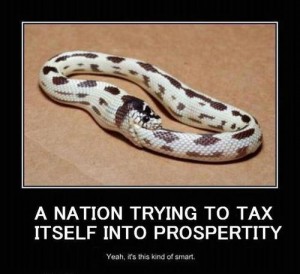“The America Republic will endure until the day Congress discovers that it can bribe the public with the public’s money.”
– Alexis de Tocqueville (1805-1859)
Taxation is theft. This one of the foundational political mantras of the Dharma Nation Movement.
 Government produces no wealth. It only confiscates wealth in the form of taxation from those who do actually create wealth, and redistributes that wealth to those who did not earn it. Moreover, government officials and corrupt politicians engage in such taxation theft, not for the actual betterment of the poor, but to buy the votes of the poor. Writing about the duplicitous nature of such corrupt politicians, Prabhupada stated the following:
Government produces no wealth. It only confiscates wealth in the form of taxation from those who do actually create wealth, and redistributes that wealth to those who did not earn it. Moreover, government officials and corrupt politicians engage in such taxation theft, not for the actual betterment of the poor, but to buy the votes of the poor. Writing about the duplicitous nature of such corrupt politicians, Prabhupada stated the following:
“Tax exaction is not meant for the sense gratification of the so-called administrative heads. Tax revenues should be distributed to the citizens in times of need, during emergencies such as famine or flood. Tax revenues should never be distributed amongst governmental servants in the form of high salaries and various other allowances. In Kali-yuga, however, the position of the citizens is very horrible because taxes are exacted in so many forms and are spent for the personal comforts of the administrators.”
(Srimad Bhagavatam 4.16.6, Purport)
Wealth belongs exclusively in the hands of those individuals, families and businesses who are directly responsible for its creation, and is not to be forcefully redistributed by the government to those who did not create it – even in the name of poverty reduction.[1] Taxation must be recognized as a necessarily unavoidable evil that all governments must seek to reduce to the absolute minimum degree that is necessary to provide basic and foundational services to the people.
A Dharma Nationalist government would call for the abolition of the Internal Revenue Service, abandonment of the current complicated, confusing and inequitable tax system, the elimination of the progressive income tax, and a rapid transition to a more fair, flat tax system. Very simply, all households with a combined family income above the poverty level (income reflecting the year 2012) will pay a simple and fair 10% maximal tax rate, and when an atmosphere of economic prosperity warrants it, less than 10%. Whether a family makes $50,000 per year, $500,000 per year, or $5,000,000 per year, the yearly tax rate will never exceed 10% of that family’s total earnings. The property tax, marriage penalty tax, death tax, and inheritance tax will be abolished outright
[1] Poverty reduction is more effectively achieved via the volunteer work of private charitable organizations, and not through the inefficient and corrupt programs of government bureaucracies.

